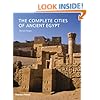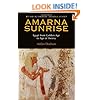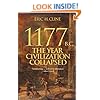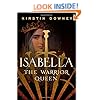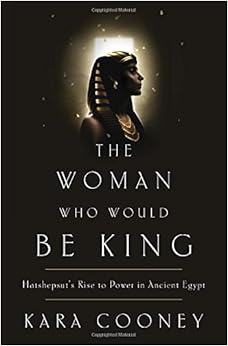
The Woman Who Would Be King
and over one million other books are available for Amazon Kindle. Learn more


Flip to back
Flip to front

The Woman Who Would Be King: Hatshepsut's Rise to Power in Ancient Egypt Hardcover – Deckle Edge, October 14, 2014

$20.52
FREE Shipping on orders over $35.
In Stock.
Ships from and sold by Amazon.com.
Gift-wrap available.
NO_CONTENT_IN_FEATURE
Start reading The Woman Who Would Be King on your Kindle in under a minute.
Don't have a Kindle? Get your Kindle here, or download a FREE Kindle Reading App.
Don't have a Kindle? Get your Kindle here, or download a FREE Kindle Reading App.
Choose Your Own Autobiography
Step right into Neil Patrick Harris's shoes in an exciting, interactive autobiography that places the reader squarely in the driver's seat. Learn more
Step right into Neil Patrick Harris's shoes in an exciting, interactive autobiography that places the reader squarely in the driver's seat. Learn more
Product Details
Would you like to update product info or give feedback on images?.
|
Editorial Reviews
Review
“The life of Hatshepsut, Egypt’s second female pharaoh, was replete with opulent living, complex royal bloodlines, and sexual energy; in short, the kind of drama that fuels Ancient Egypt’s enduring appeal…From Hatshepsut’s self-perception, political prowess, and lifestyle emerge an image of the ‘ultimate working mother’ and a compelling insight into ancient gender roles.” –Publishers Weekly
“This biography could only be based on conjecture and guesswork, but the addition of expertise makes it well worth reading. The author's Egyptology background provides the nitty-gritty of daily life and animates this king (at the time, there was no word for 'queen')… Cooney's detective work finally brings out the story of a great woman's reign.”—Kirkus Reviews
“Egyptologist Cooney peels back the layers of the life of Hatshepsut, Egypt’s second female pharaoh, providing a multidimensional portrait of a woman of strength, intelligence, and substance.”—Booklist
“The Woman Who Would Be King is a fascinating look at one of the most formidable and successful women in all of ancient history. Before Cleopatra there was Hatshepsut. Now, thanks to Kara Cooney, the real Hatshepsut stands before us in all her glory. For the first time we have a full-length biography of her that is not only a great scholarly work but also a marvelous read.” –Amanda Foreman, Georgiana: Duchess of Devonshire and A World on Fire: Britain’s Crucial Role in the American Civil War
“The compelling biography of a fascinating woman: the daughter, wife and stepmother of kings, who defied tradition to rule the most powerful nation in the Mediterranean world as pharaoh. Cooney tells her tale with authority, sensitivity and imagination. It is a tale that deserves to be told.” –Joyce Tyldesley, author of Cleopatra: Last Queen of Egypt and Hatchepsut: The Female Pharaoh
“What Stacy Schiff did for Cleopatra, Kara Cooney has done for Hatshepsut. An absolutely fantastic read about one of the most powerful Pharaoh-Queens in ancient Egypt. Completely unputdownable!” –Michelle Moran, bestselling author of Nefertiti
“The story of Hatshepsut, the woman who ruled Egypt as Pharaoh, is an amazing tale and Dr. Cooney tells it in a very personal way. Readers are going to love this version!”—Bob Brier, author of The Murder of Tutankhamen
“This biography of Hatshepsut is an ideal blend of historical analysis and an imaginative story. With her unique ability to address both the general public and scholars alike, Cooney’s narrative flows as if it were a novel, but at the same time illuminates the historical, economic, social, and religious context of Hatshepsut’s world, and that of the people surrounding her. The reader is given a glimpse into a vibrant ancient world—one that we oftentimes forget about in the midst of all the granite and mudbrick that remains today. Writing a biography of a woman about whom there is little archival information is difficult, to say the least. Nevertheless, Cooney presents a seamless picture of Hatshepsut’s life and her rise to power in ancient Egypt.” —Professor Kathleen Sheppard, author of The Life of Margaret Alice Murray: A Woman's Work in Archaeology
“Kara Cooney has written a lively, engaging, historically accurate account of one of the most controversial of Egypt's female pharaohs, Hatshepsut. Weaving together evidence from historical texts, the queen's monuments, and archaeological finds, Cooney presents an accessible story of Hatshepsut's rise to power until her demise, bringing ancient Egypt, its people, and its rulers to life. A fun and interesting read!” –Salima Ikram, Professor of Egyptology, American University in Cairo
“This biography could only be based on conjecture and guesswork, but the addition of expertise makes it well worth reading. The author's Egyptology background provides the nitty-gritty of daily life and animates this king (at the time, there was no word for 'queen')… Cooney's detective work finally brings out the story of a great woman's reign.”—Kirkus Reviews
“Egyptologist Cooney peels back the layers of the life of Hatshepsut, Egypt’s second female pharaoh, providing a multidimensional portrait of a woman of strength, intelligence, and substance.”—Booklist
“The Woman Who Would Be King is a fascinating look at one of the most formidable and successful women in all of ancient history. Before Cleopatra there was Hatshepsut. Now, thanks to Kara Cooney, the real Hatshepsut stands before us in all her glory. For the first time we have a full-length biography of her that is not only a great scholarly work but also a marvelous read.” –Amanda Foreman, Georgiana: Duchess of Devonshire and A World on Fire: Britain’s Crucial Role in the American Civil War
“The compelling biography of a fascinating woman: the daughter, wife and stepmother of kings, who defied tradition to rule the most powerful nation in the Mediterranean world as pharaoh. Cooney tells her tale with authority, sensitivity and imagination. It is a tale that deserves to be told.” –Joyce Tyldesley, author of Cleopatra: Last Queen of Egypt and Hatchepsut: The Female Pharaoh
“What Stacy Schiff did for Cleopatra, Kara Cooney has done for Hatshepsut. An absolutely fantastic read about one of the most powerful Pharaoh-Queens in ancient Egypt. Completely unputdownable!” –Michelle Moran, bestselling author of Nefertiti
“The story of Hatshepsut, the woman who ruled Egypt as Pharaoh, is an amazing tale and Dr. Cooney tells it in a very personal way. Readers are going to love this version!”—Bob Brier, author of The Murder of Tutankhamen
“This biography of Hatshepsut is an ideal blend of historical analysis and an imaginative story. With her unique ability to address both the general public and scholars alike, Cooney’s narrative flows as if it were a novel, but at the same time illuminates the historical, economic, social, and religious context of Hatshepsut’s world, and that of the people surrounding her. The reader is given a glimpse into a vibrant ancient world—one that we oftentimes forget about in the midst of all the granite and mudbrick that remains today. Writing a biography of a woman about whom there is little archival information is difficult, to say the least. Nevertheless, Cooney presents a seamless picture of Hatshepsut’s life and her rise to power in ancient Egypt.” —Professor Kathleen Sheppard, author of The Life of Margaret Alice Murray: A Woman's Work in Archaeology
“Kara Cooney has written a lively, engaging, historically accurate account of one of the most controversial of Egypt's female pharaohs, Hatshepsut. Weaving together evidence from historical texts, the queen's monuments, and archaeological finds, Cooney presents an accessible story of Hatshepsut's rise to power until her demise, bringing ancient Egypt, its people, and its rulers to life. A fun and interesting read!” –Salima Ikram, Professor of Egyptology, American University in Cairo
About the Author
KARA COONEY is an associate professor of Egyptian art and architecture at UCLA in the Department of Near Eastern Languages and Cultures. In 2005, she was co-curator of Tutankhamun and the Golden Age of the Pharaohs at the Los Angeles County Museum of Art. Cooney produced a comparative archaeology series with her husband, Neil Crawford, entitled Out of Egypt, which aired on the Discovery Channel and is streaming on Netflix.
More About the Author
Discover books, learn about writers, read author blogs, and more.
Customer Reviews
Most Helpful Customer Reviews
9 of 11 people found the following review helpful
By
Christina Paul
VINE VOICE on September 15, 2014
Format: Hardcover
Vine Customer Review of Free Product
(
What's this?
)
Comment
Sending feedback...
Egyptologist Kara Cooney is one of the few whose work I do follow on a regular basis. Kara is unafraid to ask what if, and explore avenues that many of her more dogmatic colleagues either are too afraid or unwilling to look at. In this instance, Kara has taken a look at one of the most fascinating figures in all of Ancient Egyptian history, that of the "Female King", Hatshepsut.
What most of the laypublic does not realize is that Hatshepsut or Ma'atkare, to use her name as pharaoh, was not the first nor the last to be Pharaoh in Egypt. Most traditional African cultures and traditional African religions (ATR's) can and do have women who are or have been kings. While the women before her may have only been regents ruling in the name of sons or absent husbands for a specific, rather short term, Hatshepsut was the first to do it for such a long, uninterrupted period of time. She reigned for some 22 years. The period under her rule was marked by stability, prosperity and world influence and she did it largely on her own with the cooperation of the Amun priesthood in Ipet-sut, otherwise known as Luxor.
Some critics say that Cooney has taken a feminist approach. I strongly disagree with that assertion. Kara Cooney's book on Hatshepsut takes into account a woman who did what no other woman before her had done in terms of length of rule and managed to hang on to power and influence. Earlier scholars project that Hatshepsut had wrested power away and denied it to Dhehutymose III (Thutmose III), and Cooney provides some very good arguments as to why that may not have been the case and there was largely cooperation between Hatshepsut and Djehutymose III.
So why did later kings try to obliterate her memory?Read more ›
What most of the laypublic does not realize is that Hatshepsut or Ma'atkare, to use her name as pharaoh, was not the first nor the last to be Pharaoh in Egypt. Most traditional African cultures and traditional African religions (ATR's) can and do have women who are or have been kings. While the women before her may have only been regents ruling in the name of sons or absent husbands for a specific, rather short term, Hatshepsut was the first to do it for such a long, uninterrupted period of time. She reigned for some 22 years. The period under her rule was marked by stability, prosperity and world influence and she did it largely on her own with the cooperation of the Amun priesthood in Ipet-sut, otherwise known as Luxor.
Some critics say that Cooney has taken a feminist approach. I strongly disagree with that assertion. Kara Cooney's book on Hatshepsut takes into account a woman who did what no other woman before her had done in terms of length of rule and managed to hang on to power and influence. Earlier scholars project that Hatshepsut had wrested power away and denied it to Dhehutymose III (Thutmose III), and Cooney provides some very good arguments as to why that may not have been the case and there was largely cooperation between Hatshepsut and Djehutymose III.
So why did later kings try to obliterate her memory?Read more ›
Thank you for your feedback.
If this review is inappropriate, please let us know.
Sorry, we failed to record your vote. Please try again
7 of 9 people found the following review helpful
By
JLee
VINE VOICE on September 8, 2014
Format: Hardcover
Vine Customer Review of Free Product
(
What's this?
)
1 Comment
Sending feedback...
This book is not a comprehensive, scholarly study on the reign of Hatshepsut. It is, instead, a lightweight and general overview of Hatshepsut's reign, with a very imaginative twist. It would probably contain more than enough detail for most people.
The author, who has written for television (and it shows), tries to psychoanalyze and interpret the motives and actions of the principal players - to fill in the blanks. A lot of people will appreciate her entertaining style and much prefer it to a more academic study. Paragraph after paragraph contains words like "maybe" or "perhaps" or "could have." The language sometimes detours into the lurid and melodramatic. There are some graphic descriptions of dying infants and diseases and gastrointestinal maladies and of the mummification process that turned my stomach. Sex is a recurring topic, and anyone reading this book might incorrectly suppose that women in Egypt were viewed purely as sex objects. This is the sort of stuff that appeals to many and makes successful TV shows, but it is not necessary in scholarly studies.
Buried under all the "maybes" and "could haves" is a fair and even-handed (if too brief and incomplete) consideration of Hatshepsut and her reign. I found that she was quite clear on what is fact and what is speculation. Cooney has actually done a very fine job of sifting through all the rubbish that has been written about Hatshepsut. And, oh, my, there has been so ever much rubbish written about Hatshepsut.
When Hatshepsut's name was first discovered (after Champollion's decipherment of hieroglyphs) she was, as a king, assumed to be a male. The idea that he was actually a she was shocking to early historians and very, very slow to be accepted.Read more ›
The author, who has written for television (and it shows), tries to psychoanalyze and interpret the motives and actions of the principal players - to fill in the blanks. A lot of people will appreciate her entertaining style and much prefer it to a more academic study. Paragraph after paragraph contains words like "maybe" or "perhaps" or "could have." The language sometimes detours into the lurid and melodramatic. There are some graphic descriptions of dying infants and diseases and gastrointestinal maladies and of the mummification process that turned my stomach. Sex is a recurring topic, and anyone reading this book might incorrectly suppose that women in Egypt were viewed purely as sex objects. This is the sort of stuff that appeals to many and makes successful TV shows, but it is not necessary in scholarly studies.
Buried under all the "maybes" and "could haves" is a fair and even-handed (if too brief and incomplete) consideration of Hatshepsut and her reign. I found that she was quite clear on what is fact and what is speculation. Cooney has actually done a very fine job of sifting through all the rubbish that has been written about Hatshepsut. And, oh, my, there has been so ever much rubbish written about Hatshepsut.
When Hatshepsut's name was first discovered (after Champollion's decipherment of hieroglyphs) she was, as a king, assumed to be a male. The idea that he was actually a she was shocking to early historians and very, very slow to be accepted.Read more ›
Thank you for your feedback.
If this review is inappropriate, please let us know.
Sorry, we failed to record your vote. Please try again
3 of 4 people found the following review helpful
By
Wilhelmina Zeitgeist
VINE VOICE on September 19, 2014
Format: Hardcover
Vine Customer Review of Free Product
(
What's this?
)
Comment
Sending feedback...
"The Woman Who Would Be King: Hatshepsut's Rise to Power in Ancient Egypt" by Kara Cooney is a wonderful biography about a female pharaoh I never heard of before. The information in this book was well researched and the writing superb and engaging. I did not find this historical account to be at all dry or boring. Quite intriguing and, I dare say, somewhat of a page turner.
This woman king was very intelligent and shrewd. It's always eye opening to see what lengths women through history have had to do or resort to in order to justify and hold their rightful place in society. Just because you're the King doesn't mean your life is going to be a day at the beach. If anything, it makes life even more precarious.
An enjoyable and informative read for anyone who has a fascination with Ancient Egyptian History, Women's Studies, history in general, or just a good non-fiction book that you can learn something from.
This woman king was very intelligent and shrewd. It's always eye opening to see what lengths women through history have had to do or resort to in order to justify and hold their rightful place in society. Just because you're the King doesn't mean your life is going to be a day at the beach. If anything, it makes life even more precarious.
An enjoyable and informative read for anyone who has a fascination with Ancient Egyptian History, Women's Studies, history in general, or just a good non-fiction book that you can learn something from.
Thank you for your feedback.
If this review is inappropriate, please let us know.
Sorry, we failed to record your vote. Please try again
2 of 3 people found the following review helpful
By
Mrs. K
VINE VOICE on September 30, 2014
Format: Hardcover
Vine Customer Review of Free Product
(
What's this?
)
Comment
Sending feedback...
This was a pretty compelling read for me.
When I was a kid, I was all about Egypt--King Tut was touring, I read everything I could find. But it was severely edited. Even the stuff I've seen since has been sanitized to some extent.
This book had a lot of interesting information that was totally new to me. Hatshepsut herself was well ahead of her time. It sounds like she did more for Egypt than Cleo ever did.
What I really enjoyed was that Woman Who Would Be King was written for normal people. She does cite sources, but it's not a dry dissertation. I can see where some of her conclusions would be controversial--to anthropologists weaned on patriarchy it would probably chafe a little. But I appreciate that she worked within the world she had to enrich Egypt and support her dynasty.
If things ever calm down in the Middle East, I might have to take a Hatshepsut tour.
When I was a kid, I was all about Egypt--King Tut was touring, I read everything I could find. But it was severely edited. Even the stuff I've seen since has been sanitized to some extent.
This book had a lot of interesting information that was totally new to me. Hatshepsut herself was well ahead of her time. It sounds like she did more for Egypt than Cleo ever did.
What I really enjoyed was that Woman Who Would Be King was written for normal people. She does cite sources, but it's not a dry dissertation. I can see where some of her conclusions would be controversial--to anthropologists weaned on patriarchy it would probably chafe a little. But I appreciate that she worked within the world she had to enrich Egypt and support her dynasty.
If things ever calm down in the Middle East, I might have to take a Hatshepsut tour.
Thank you for your feedback.
If this review is inappropriate, please let us know.
Sorry, we failed to record your vote. Please try again

